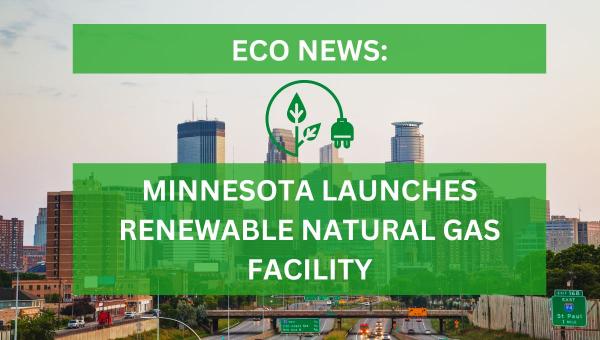Eco News: Renewable Natural Gas Facility Launched in Minnesota
- November 21 2022
- 3 min read
Eco News: Renewable Natural Gas Facility Launched in Minnesota

In a push to tackle climate change and increase renewable energy sources in the US, Minnesota has launched its first Renewable Natural Gas (RNG) production facility.
The project estimates production of the equivalent of 6.3 million gallons of gasoline in RNG each year. This comes as the oil and gas industry seeks to find ways of lowering carbon emissions for a sustainable future.
How do we produce RNG?
The Pine Bend RNG Project captures a mixture of gasses, primarily methane, from the landfill it’s based on. As organic matter in the landfill decomposes, it releases methane (a potent greenhouse gas). While this would usually enter the atmosphere and cause damage to the ozone, the facility transforms these biogasses into Renewable Natural Gas.
The process involves purifying the landfill gasses to a standard that’s acceptable for use in pipelines.
How do we use RNG?
We can use Renewable Natural Gas for transportation fuel by purifying it into liquefied natural gas (LNG) or compressed natural gas (CNG). Large trucks that we use across the US for transporting goods often run off LNG. Being able to produce LNG from landfill sources means we can prevent the release of harmful gasses into the atmosphere while cutting down on the amount of non-renewable gas used.
For use in vehicles, Renewable Natural Gas needs to meet the Renewable Fuel Standard set out by the US Environmental Protection Agency (EPA).
Other uses for Landfill Gas
There are a number of facilities across the US that already utilize landfill gas (LFG). With only minor processing, LFG can be clean enough to use for gas pipelines to power plants, and used for electricity generation or heating. This reduces the amount of natural gas that we need to use, which is usually from a non-renewable source.
How your business can be more sustainable
You don’t need to be turning organic waste into Renewable Natural Gas to be more sustainable. Small changes can make a big difference.
If you own a store, try switching out your single-use plastic bags for recycled, reusable grocery bags. For office-based businesses, encourage an eco-friendly attitude amongst your employees with custom reusable mugs. This allows your break room to cut out plastic coffee cups that end up in the trash. If you’re a fashion retailer, you can even buy labels made from seed paper for your clothing.
It's also worth being conscious of the amount of energy your business uses. You can also engage in a local recycling programme or install timed taps to cut down on water waste.
Gain access to Orders, Tracking, Custom Options and Much More!